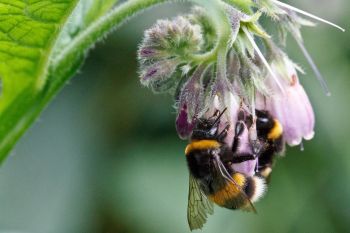Help monitor bees with University of Sussex scientists
By: James Hakner
Last updated: Monday, 25 January 2016

Bumblebees are important pollinators. Image: Dave Goulson
Bee researchers at the University of Sussex are looking for volunteers for the third year of a successful ‘citizen science’ project, looking into whether there are enough bees left in our gardens and towns to properly pollinate fruit and vegetables.
Members of the public who take part in the study will receive a packet of dwarf-bean seeds and instructions on how to perform a simple pollination experiment: keeping pollinators away from some flowers, hand pollinating others and comparing to the efforts of local insects. Taking part requires no extra knowledge or experience, just a few minutes per week during the summer, and at the end you get to eat the beans!
Many bee species are rarer than they used to be, hurt by changes in farming and loss of flower-rich habitats. There is concern that bee declines could cause a ‘pollination crisis’ and a failure of crop yields, which has already happened elsewhere in the world.
Featured in the Guardian last year, Bees ‘n Beans aims to address an important gap in our knowledge about UK pollinators – whether there are enough pollinators across the country to pollinate our garden favourites (as well as wild plants and crops), and if the populations have declined rapidly anywhere. This third year of data collection is important to allow the team to examine regional changes in pollination, and determine if the project is suitable to be pushed for as a national monitoring scheme.
Previous years have seen various other plants tested alongside the beans, and this year the project team would like volunteers to compare results between pot-grown and soil-grown beans. The results from individual gardens will be compared across the country to see if pollination has been depleted, and volunteers will be informed of the results of that analysis.
Professor Dave Goulson, who has studied bumblebees for 20 years, says: “This fun and educational science project is suitable for children or adults, and for any outside space.”
PhD student Linda Birkin, who co-ordinates the study, adds: “Many of our garden favourites rely on bee pollination to produce crops; including beans, raspberries, tomatoes, blueberries and so on, as well as hundreds of species of wild flower.
“So if there aren’t enough in parts of the UK, we need to be able to spot those declines and react accordingly.”
The ‘Bees ‘n Beans’ 2016 project will start in April. To find out more, and sign up, go to www.ljbees.org.uk, or email Linda Birkin at l.birkin@sussex.ac.uk.
